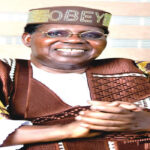Professor Eghosa Osaghae’s Remarks at the Awo Leadership Webinar on March 6, 2025.
Thank you very much Professor [Alade] Fawole. Thank you President Thabo Mbeki. Thank you, Ambassador Tokunbo Awolowo Dosumu. Thank you, Your Excellencies. Professor Kingsley Moghalu, congratulations. Kigali is your new abode. I hope you are enjoying it and that they are treating you well.
Now, I’m happy that I have come after that very insightful presentation by Professor [Jeffrey] Sachs. And I have as my point of entry the question asked by the Governor of Oyo State, His Excellency Seyi Makinde, on this whole thing that everyone talks about now. It’s as if Africa has become one big country. When you hear people talk about Africa without any differentiation, the thought that comes is, ‘oh, well, yes, you know, Africa is equivalent to India, is equivalent to China’, is equivalent to every big country and so on.
But that is not the reality of Africa. Africa is very heterogeneous; it is diverse. The most remarkable thing is that African countries and societies at different levels of development are diverse. That’s very key. It’s in this same Africa that we have countries that have been perennially fragile and have not been able to live up to the status of proper states in that sense. We have those kinds of problems in the same Africa that we’re talking about.
Now, this same characterisation can be extended to the notion of the Global South. The Global South has become a short reference for what you might regard as the developing countries of the world. And yet we know that in this Global South, you have big powers like China; you have India, just as you have Chad. You have East Timor. So this Global South itself is such an amalgam and I think the entry point there is the Global North, which, in relative terms is a lot more coherent. It’s a lot more powerful. It’s not just a gathering of the most developed countries in the world, it’s a gathering of people who share similar cultures, who have long histories of being together, and who have, most of all, been part of an ideological action set that dominated the world since the Second World War dispensation. And so you have a Global North that actually has the entire world at its feet. It controls the world in every sense.
And the Global South is, as we all know, at the margins. The Global South remains very weak and marginalised. So what would the Global South and the Global North have to get, considering that, historically, the Global South finds itself where it is because of the historical imbalances and structural imbalances that have been instituted going back to the era of imperialism and colonialism? The Global South, we all know, has what I’ve called diversity. It is highly fragmented and has different levels.
But the Global South has had a history also of organising to counteract its domination in the global order. And that is why following independence, the non-aligned movement, was there for a long time. And we had the Group of 77. We’ve had all kinds of coalitions. The whole idea is to say, we have to do something about our exclusion or marginalisation and so on.
So for those of us who think that globalisation works for everyone, the Global South has always said we think, we need to do something, to take something that would redeem us of many of these things [that is] in reference to reparatory justice, which is the theme for the AU for the 2025 summit and which, incidentally, is also the theme for the Caribbean states at this time.
So there is increased consciousness. It is a consciousness that has been established since the developing countries recognised that their future would lie in coalition building and how much they can work for themselves and with themselves. Now, you will know that whether it is in Bretton Woods institutions or its other multilateral platforms, including the WTO and so on. These are platforms, these are very powerful players in the global political economy that were set before African countries and Asian countries and Latin American countries came in as ‘joiners’ to the ‘founders’.
[The term] ‘joiners and founders’ is something that I owe to the late Professor Omo Omoruyi, who says that in many of these organisations, you have those who founded and those who joined. So the founders in whose interests these multilateral platforms were established have continued to remain the dominant forces. In the most recent past, you would know that, as I said, the Global South has always recognised that its greatest strength would lie in staying together, acting together and seeing what things can be done within the developing world, complementarities that would help and so on. I think that has been the guiding principle that today has found vent in, say, the BRICS Plus, which we have talked about. It has found vent in, say, the increasing strength of the AU, for instance, and those other cooperative platforms.
Now, the question is, are we going to find a dramatic or revolutionary thing, given the inflection points that currently characterise the global scene? I think so. For the reasons that many of the speakers today have talked about, whether it is strategic minerals, whether it is the demographic bulge, whether it is those kinds of advantages and so on.
But I think that the trends towards de-globalisation that we have seen, the trends towards economic nationalism and the strengthening of right-wing tendencies, ultra-nationalism and so on, are simply pointing in one direction. These countries, whether they are in Africa or Latin America or Asia, wherever they are, have to realise that they have to do things for themselves. The days of humanitarian assistance are over. And I think that’s the critical point that we should now all engage very seriously. The Lagos Plan of Action, 1980, had said, you know, there is no way Africa, for instance, can make progress except and until Africa is able to redeem itself and reassert not just its autonomy, but also its self-determined choices.
And, you know, in the development process, you cannot play the role of “the developee” that is guided by the desires and the templates of those who give you money. You must create your own money. You must create your own wealth. So I think that it is not autarchy, meaning that, you can live in isolation. Nobody says that.
But our response to de-globalisation and the fact that we are becoming even more marginalised, look at the digital divide that the Professor [Seun Kolade] talked about earlier, look at the technological things and so on, It is the point where I think the way forward for the global South, but especially for Africa, would be to use that thing that everyone talks about: look for African solutions to African problems. I mean, that has to be the way to go. And I agree that, in doing this, we must go back to what Mazrui had said in 1963. In 1963, Professor Ali Mazrui wrote a very seminal article. The title was on the concept of “We are all Africans” and he said, for instance, what ties the African in Tanzania, or it was Tanganyika, to the African in Sudan? What ties the African in Namibia to the African in Chad? He says, come to think of it, there is very little that ties all of us together, except that in relation to the outside world, we now are able to realise that we are all Africans. I think that is the key force.
So, yes, we are all Africans at the regional levels of ECOWAS and the East African community and SADC and so on. We are all Africans at the level of AU and all of the things that will make us global South people. Those kinds of things that we find everywhere.
But I think that we must not be deceived. We cannot make progress in science and technology if we do not seize the moment to get into our own self-determined ways of building our science and technology. We must do that. We must take it seriously. We cannot continue to depend on humanitarian aid, you know, of that kind.
We have states that are very fragile. We must address these things ourselves. And we would like to see how the Global South can provide options that will guide all of us, given our commonalities and the kinds of problems that we face, given the global injustices that continue to keep us at the margins, and given the need for us to become even more assertive of our self-determined choices.
So I think it is good for summit diplomacy to put Africa in the middle. But you all know that summit diplomacy dealing with Africa is not really dealing with Africa at all. So, in the same way that you can put summit diplomacy around Global South and pretend that you have a new coalition, you have a new power bloc, you have a new economic bloc, the contradictions of fragmentation are obvious for all of us to see. So I think that Global South and Global North would be, but we must be more discerning to see that, even within the context of globalisation, those contradictory forces would need to be addressed.
I thank you and I congratulate the Obafemi Awolowo Foundation once again.
- Professor Eghosa Osaghae is the Director-General, Nigerian Institute of International Affairs
READ ALSO: ‘Learning science and technology using local languages improves creative thinking’






